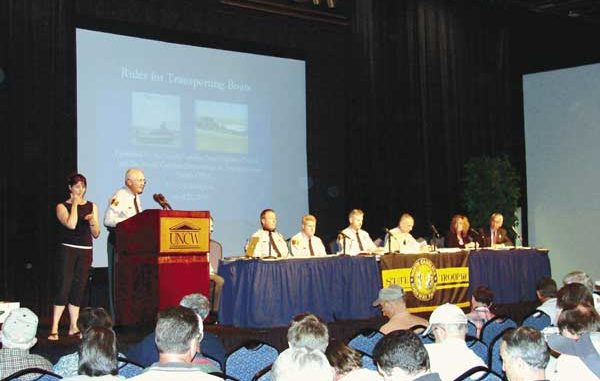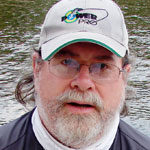
The Warwick Center at UNC Wilmington hosted the N.C. Highway Patrol’s first public forum April 21 to explain laws regarding towing boats and how those laws are enforced.The meeting, eagerly anticipated by members of the boating public, filled the room almost to capacity with approximately 300 boaters from across the state. Many boaters drove from the piedmont and one gentleman arrived from Asheville.
The concerns that fostered this meeting began in late summer 2007 when N.C. Highway Patrol officials stopped several anglers and gave them tickets that resulted in large fines/fees for illegally trailering their boats. Making the matter worse, the fines were classified as federal civil citations so boaters had to pay before continuing their travels.
As a result, boaters flooded the NCHP and Division of Motor Vehicles with phone calls. Boaters wanted to know N.C.’s exact trailering laws and what they had to do to comply.
They discovered these laws had been in effect for years, but in the past the NCHP considered them more applicable to commercial haulers, not individuals towing personal boats.
Unfortunately, when the NCHP increased enforcement, few people in DOT offices knew about these laws and gave conflicting answers to questions.
While they didn’t care for the laws and the suddenly increased application to recreational boat trailers, owners sought information to be able to comply. However, in many instances, a variety of official answers led to even more confusion.
North Carolina Sportsman reviewed the ordinances in its January 2008 issue and also encountered confusing and conflicting official responses to questions. Meanwhile, the NCHP met to decide upon uniform enforcement of trailering laws. It also planned a public forum at UNC Wilmington to present information to boaters before the boating/fishing season got into full swing.
The NCHP decided to review several areas of concern, including:
• allowable boat /trailer widths and weights;
• full load weights of boat, trailer and tow vehicles;
• tow-vehicle license plates and drivers license categories;
• and what constitutes using a boat and trailer in a commercial enterprise.
In addition, the NCHP said these concerns have been considered mostly a coastal problem, but in actuality, trailering laws affect anyone who tows a boat on N.C. roads — from Manteo to Murphy.
Boat widths
Under existing law, a boat trailer wider than 8 feet, 6 inches only may be towed during daylight hours, Monday through Saturday, during non-holidays or the day immediately preceding or following a holiday.
If a boater wants to use his pontoon boat Sunday at a lake, and the craft is wider than 8 1/2 feet, the owner must launch Saturday before dark and can’t tow the boat on the highway again until Monday after daylight.
The law is more restrictive during holidays, when the legal towing time for boat trailers or vehicles wider than 8 1/2 feet ends at noon the day before the holiday begins and starts again at noon the day following the holiday.
Width measurements for boat trailers are taken at the widest point on a boat or trailer. Upright trailering guide posts used on many trailers also are included.
Weighty issues
North Carolina Sportsman reported most weight information during our January report, but some information we discovered later.
The two easy weight numbers to remember are 3,000 and 4, 000 pounds.
At capacities of 3,000 pounds or heavier, trailers registered in this state are required to have functional brakes.
At 4,000 pounds or heavier, N.C.-registered trailers must pass an annual safety inspection. State-approved auto inspection businesses that perform annual vehicle-safety and emissions inspections also can inspect boat trailers.
Trucks registered privately but without weighted-category license tags may tow a combined load (truck and trailer) up to 9,000 pounds. Once a boat-trailer exceeds this weight, the tower must purchase weighted tags of weight equal to or greater than the total load of truck and trailer.
A trailer-boat weight of 10,000 pounds or more means the driver of the tow vehicle must have a valid Class A driver’s license.
More importantly, Chris Hartley of the U.S. Department of Transportation said 10,000 pounds is the minimum weight that determines a business venture if a driver crosses state lines while towing to a fishing tournament.
Hartley also said any vehicle/tow package combination in excess of 10,000 pounds is required to pass through weigh stations.
Driving a tow vehicle heavier than 26,000 pounds requires a Class B driver’s license — if the towed load is less than 10,000 pounds. A Class A driver’s license is needed if the towed load weighs more than 10,000 pounds.
This weight also determines a business venture if the driver is towing to or from an in-state fishing tournament.
License plates
The NCHP said at the UNCW meeting that SUVs registered as passenger vehicles are exempt from weighted license-tag requirements.
Private pickup trucks, registered with a private license tag (plates with the inscription “First in Flight”) may trailer a combined total load (truck, trailer and boat) of as much as 9,000 pounds.
If the total load is heavier than 9,000 pounds, a weighted license tag is required with enough capacity to cover the combined load of the truck trailer and load.
Drivers licenses
Most drivers only need a standard Class C driver’s license, the same as required to drive any car. This license is acceptable for towing loads of less than 10,000 pounds as long as the towing vehicle weighs less than 26,000 pounds.
If the towing vehicle is heavier than 26,000 pounds and the towed load is less than 10,000 pounds, a Class B drivers license is needed.
Regardless of the weight of the towing vehicle, if the towed load is heavier than 10,000 pounds, a Class A drivers license is required.
To obtain a Class A license, the applicant must pass a road test, pulling the trailer he wants to tow.
Commercial Drivers Licenses are for individuals driving for a commercial enterprise (involved in making a financial profit).
At the meeting, NCHP officials and Hartley said competing in a fishing tournament should be considered a commercial enterprise.
Another factor the NCHP and DOT use to determine commercial enterprises is the presence of corporate sponsor logos on a boat or tow vehicle. If a corporate sponsor logo is present and an angler is traveling to a tournament, the driver is considered to be involved in a commercial enterprise — regardless of weight.
In order to avoid problems, drivers may add a CDL license to the class of driver’s license is appropriate.
Commercial enterprises
At UNCW, what the NCHP and DOT consider commercial enterprises generated the most misunderstandings and seemed to have the greatest potential for conflict.
According to Hartley, the potential for making money is all that is required to constitute a commercial enterprise.
However, one hair-splitter was the word “profit.” Simply stated, profit is the primary goal of any business. Anyone who makes more money than he spends is considered to have turned a profit.
However, if the total cost of fishing a tournament is $3,500 and an angler collects a check for more than that, he has made a profit, according to NCHP and DOT rules, even if the check is for $3,501. If a check totals less than $3,500 or an angler didn’t win any money, he has suffered a financial loss.
The IRS allows deductions for tournament and gambling winnings as “hobby” deductions. These deductions only may total expenses up to the amount of the winnings.
Unless tournament fishing is one’s primary income, the IRS classifies it as a hobby. Any losses attributed to hobbies can’t be used as a deduction from other income. The IRS allows for extra winnings (ask a lottery winner). However, for anyone who holds a full-time job, tournament fishing is a hobby and by IRS guidelines expenses may only be deducted up to the amount of the winnings.
The obvious question is this: Because the IRS already is the official federal agency for deciding business profits and losses and the N.C. Department of Revenue is its state-level counterpart, why not let the agencies do their jobs and allow the Highway Patrol to concentrate on enforcing highway regulations and preserving highway safety?
It seems clear the NCHP could better spend its time performing those duties rather than standing on the side of the road, arguing with anglers whether or not they have a potential for profit.
Political concerns
Several N.C. legislators attended the UNCW meeting and promised to get these laws “straightened out.”
Politicians included N.C. House Representatives Bonner Stiller (R-Brunswick), Pat McElraft (R-Carteret), Carolyn Justice (R-Pender, New Hanover), State Senator Julia Boseman (D-New Hanover) and Mary Ellen Simmons of U.S. Congressman Mike McIntyre’s (D-NC) office.
The legislators were respectful of the NCHP and said they weren’t criticizing but wanted to give that agency better laws to enforce.
Boat builders, boat dealers and local municipalities’ officials also attended the meeting.
While not allowed to speak during the meeting, Mayor Alan Holden of Holden Beach expressed concern for the potential loss of tourism revenue if boaters weren’t allowed to easily bring their boats to the coast. McElraft and Stiller echoed Holden’s concern.
“If we aren’t working for the tourists and out-of-town boaters, they’ll find somewhere else to go,” Stiller said. “We surely don’t need to be making it difficult for them.”
An Internet posting from William Gore Jr., N.C. Commissioner of Motor Vehicles, was mentioned by Stiller, who pointed out Gore’s initial career as a judge made him well-suited to express an informed opinion.
“Historically, the Division has considered boats and their trailers as recreational vehicles and will continue to do so until such time as the General Assembly changes the law to reflect that they are not recreational vehicles,” Gore wrote to Capt. Nichols of the NCHP. “Absent some indication of commercial purposes, when a consumer is paid some small purse during a fishing tournament, it is my opinion the primary purpose of the vessel and its related trailer is still recreational.”
Another item working through the audience was a list of boat-and-trailer restrictions from other southern and Gulf Coast states compiled by Bob Flocken of the Southern Kingfish. The list noted while the basis for each state’s trailering laws is federal law, other states are much more liberal in enforcement than North Carolina.
Examples of more liberal trailering laws include:
• Georgia: Travel only restricted from ½ hour before sunset to ½ hour before sunrise.
• Florida: Travel permitted ½ hour before sunrise to ½ hour before sunset and also permitted Saturday and Sunday, if a towed vehicle isn’t more than 10-feet wide, 13 1/2-feet tall and 55-feet long.
• Louisiana: Travel permitted ½ hour before sunrise to ½ hour before sunset Monday through Saturday and until 1 p.m. Sunday, if a towed vehicle is less than 12-feet wide, 90-feet long and 100,000 pounds.
• Texas: Travel permitted ½ hour after sunrise to ½ hour before sunset. Weekend travel is permitted if a towed vehicle is less than 14-feet wide, 110-feet long or 16-feet tall.
Opponents of current laws said N.C. boat owners should contact their senators and representatives and let them know if they’d like to see the laws changed. No one wants to compromise highway safety, but trailered boats doesn’t appear to be an issue. Modern highways and vehicles are far superior to what they were when current laws were adopted more than 20 years ago.
One NCHP officer said at the UNCW meeting he couldn’t remember investigating an accident caused by someone towing a boat.
The web site for viewing N.C. legislative action and contact information for senators and representatives, plus a listing of committees and members, is at www.ncleg.net.




Be the first to comment